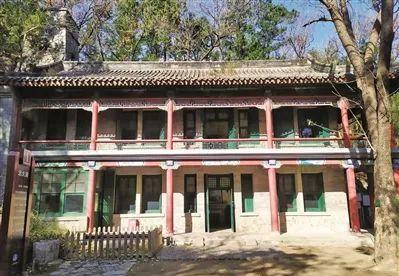In the Niubi Mountain Pass in The West Of The village of Bei'anhe in Haidian District, Beijing, there is a combination of Chinese and Western buildings built on the mountain, which is called "Beijia Garden" by locals. It is named after a French doctor named Pei Xiye. More than 70 years ago, it was a secret contact point for medical supplies and personnel in the Pingxi anti-Japanese base area and the Pingjin area, and made important contributions to the cause of the Chinese revolution.

At the beginning of the 20th century, Bei Xiye, a French medical doctor who was in a confused year, came to Beiping alone and lived in China for nearly 40 years. He has served as a medical officer of the French Legation, a medical adviser to the president of the Beiyang government, the president of the Peking French Hospital, and a doctor at Peking University. Pei Xiye is a humble person, can speak fluent Chinese, and his medical skills are also very exquisite. He is not only quite famous in the upper circles, but also many times for the people to see a doctor for free, save lives and help the injured.
Pei Xiye built the Beijia Garden in 1923 in the eastern foothills of the Balcony Mountain on the outskirts of Beijing. Beijia Garden is composed of three parts: the Watchtower, the North University Room and the South Big House. Originally used for anti-theft purposes, the watchtower was later converted into a clinic by Pei Xiye to provide medical services for the surrounding villagers; the Peking University House is Pei Xiye's living room; the South Big House is used as a living room, and Bei Xiye often invites friends in the capital to come here to gather and chat.
In July 1937, the Lugou Bridge Incident broke out, and Pei Xiye witnessed the brutal japanese invasion of China. His sense of responsibility and justice as a doctor led him to write to the Red Cross Society of China on behalf of foreign medical officers in China, expressing his willingness to support China's anti-fascist war.
The Beijia Garden happens to be located between the Pingxi Anti-Japanese Base Area and Beiping City, and is also the place where the secret communication line opened up by our Party passes. It has a unique geographical advantage, easy to defend and difficult to attack, and as Pei Xiye's private residence, it is not easy to arouse suspicion from the outside world. After the underground workers of the party in Beiping learned about the situation, they actively ran away and secretly contacted Pei Xiye. With the vigorous assistance of Pei Xiye, many scarce medicines were transferred to the Anti-Japanese Base Area in Pingxi through here, and many revolutionaries also went to the anti-Japanese front line from here. According to historical records, Pei Xiye once risked his life to ride tens of kilometers, avoiding the japanese army's interrogation, and brought the medicine back to the Bei family garden from the big sweet water well apartment in Wangfujing, and then secretly transported it to the anti-Japanese front line, and opened a bicycle "hump route" alone. In addition, Pei Xiye has repeatedly risked his life to help international anti-fascists leave Peiping, including The British professor Lin Mike, who teaches in Beiping. Under the cover of the Beijia Garden, Lin Mike successfully went to the Anti-Japanese Base Area in Pingxi and finally arrived in Yan'an. Later, Lin Maxe helped the Eighth Route Army train a group of radio technicians and established the Yan'an Radio Station for English as a Foreign Language.
Later, Pei Xiye returned to France. After returning to China, he still remembers the years he fought in China. Although he did not personally go to the battlefield, as an international friend who supported the War of Resistance, he fought against fascism with practical actions and contributed to the cause of the liberation of the Chinese people. Time flies, and the Scythians are gone. Today, several buildings preserved in the Beijia Garden, as historical witnesses of Sino-French friendship, still carry the fighting spirit of predecessors and silently inherit the anecdotes of a foreign doctor in the years of the War of Resistance.
(China National Defense Daily, December 30, 2021, fourth edition)
Source: China National Defense Daily